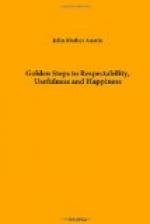[Footnote 11: John v. 39.]
Admitting then, as you must, the privilege of others to differ from you in religious sentiment, you should not allow that difference to be a matter of offence. It should be no disparagement in your view, nor lessen them in your estimation. However great you may consider the errors of your neighbors, if you are satisfied they are sincere, you should respect them for their sincerity! Hypocrisy, in every form, should be denounced. Those who profess to believe what they do not, or to be what they are not—who assume the Christian name when they are in fact, but bitter and narrow-minded bigots—are only worthy to be heartily despised.
Let me caution the young, also, against a spirit of exclusiveness. In our age and country, a religious aristocracy is no more to be acknowledged than a political. All denominations stand on an equality, in their rights and privileges, and in the estimation in which they are to be held as public bodies. No sect can put on airs, and assume to lord it over others, in any respect whatever, without subjecting itself to the severest censure. Among the rights belonging equally to all, is the Christian name. Every denomination which receives the Scriptures as the inspired word of God, and believes in Jesus Christ, as the Son of God and the Saviour of men, is justly entitled to the name of Christian, and to be acknowledged and treated as such. This is the only test laid down in the New Testament, as a careful examination will satisfy the candid mind.
For any one sect to attempt to monopolize the Christian name, and assume that all the piety, godliness, and virtue in the land, is to be found in its borders alone, is to place itself in a most ridiculous position. A pretence so arrogant and groundless, in our enlightened day, can have no other effect than to excite a smile of pity on the countenance of sincere and candid Christians. I would have the young give no countenance to these pretensions; but seek to attain to higher and nobler principles. Let them place sectarian bitterness and prejudice beneath their feet, and imbibe enough of the Christian spirit to acknowledge freely, that, in all denominations, good and pious people can be found.
In estimating those of other views, the young should avoid denouncing a whole denomination, and condemning their doctrines as demoralizing, because some corrupt men may have been found in their midst. If this rule of judging was generally adopted, where is there a class of Christians which could stand? Were there not among the chosen twelve of our Saviour, a Judas to betray him, and a Peter to deny him with oaths? Shall we, therefore, insist that Christianity is false and corrupting? There are few sects in the land, which have not had both clergymen and church-members guilty of the most corrupt practices. Are we to conclude from this, that the doctrines of those who have had these unworthy members, are false and licentious? Who are willing to adopt this test? A denomination cannot consistently apply a test to others which they are not willing to abide by themselves.




